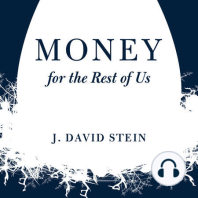29 min listen
Trade Wars Increase Prices and Poverty
ratings:
Length:
30 minutes
Released:
Jul 11, 2018
Format:
Podcast episode
Description
#212 How a complex global trade system has reduced poverty, raised incomes, increased productivity, and lowered prices while a trade war will reverse those trends. You can find show notes and links here. Thanks to Blooom and Wunder Capital for sponsoring this episode.Episode SummaryPresident Trump recently unveiled new tariffs on trade with China, and many fear this decision could lead to a trade war. This 25% tariff on $34 billion worth of Chinese imports into the U.S. and an additional $216 billion of announced tariffs will change the trade landscape in the coming months. On this episode of Money For the Rest of Us, David explains why trade wars tend to increase the prices of goods and the poverty rate. He discusses the consequences attached to global trade tariff decisions and outlines why healthy global trade is successful in reducing poverty. To hear informed information about the complexities of tariffs and global trade, be sure to give this episode your full attention.Why does the US run such a large trade deficit with China? In 2017, China exported over $500 billion worth of goods to the US. In that same year, the US exported $130 billion to China, resulting in a trade deficit of $375 billion. Why is this figure so high? There are three main reasons why the US has such a large trade deficit with China:China has a lower standard of living and pays workers lower wagesTechnology and the internet has reduced the risk to US businesses when importing from ChinaAt times, the Chinese yuan is too weak relative to the US dollarHealthy global trade reduces poverty - here’s whyCountless economists and writers have examined why healthy global trade reduces poverty. In 1981, the percentage of the world’s population living in extreme poverty was holding at 42%. Since then, the number of people living at that level of income has fallen by 1 billion. And in 2013, the most accurate data puts the world’s population living in extreme poverty was 10%. This figure has fallen so dramatically because of trade, specifically because China has significantly ramped up its manufacturing capabilities and exports, increasing household income through higher wages.From 1820 to 1920, in Great Britain the percentage of the population in extreme poverty fell from 40% down to 10% from the 1820s to 1920s. From 1870 to 1970, Japan did the same - taking their poverty population from 80% down to nearly 0%. China is on course to reduce extreme poverty even faster. To hear more about the relationship between poverty and trade, don’t miss this episode of Money For the Rest of Us.Global tariffs can lead to unintended consequencesTrends show that both the US and China are wealthier because of trade. However, trade wars have the power to reverse those trends and increase the level of global poverty once more. There are 2 types of unintended consequences: those that are positive and natural, and those that are negative and disruptive. Positive consequences include developing powerful and beneficial global relationships between countries producing various goods. However negative consequences could destroy a complicated global supply network that has been slowly built, year by year, into the powerhouse that it is today.Companies and industries are adaptable when tariffs are imposed. However, there’s only so much flexibility a company can handle before having to make sacrifices. Moving production facilities, cutting wages, or increasing prices when faced with steep tariffs. These consequences should never be overlooked when considering new tariff plans and laws.Trade wars aren’t the solution to unfair trade practices - but THIS is Trade wars caused by broad based tariffs are not the solution to unfair trade practices. In order to remain globally competitive and productive, US companies need trade deals that recognize the strength that comes from global operations and supply chains. Trade wars are a complex subject, and this need-to-know info is best understood by liste
Released:
Jul 11, 2018
Format:
Podcast episode
Titles in the series (100)
Are You A Materialist? by Money For the Rest of Us
